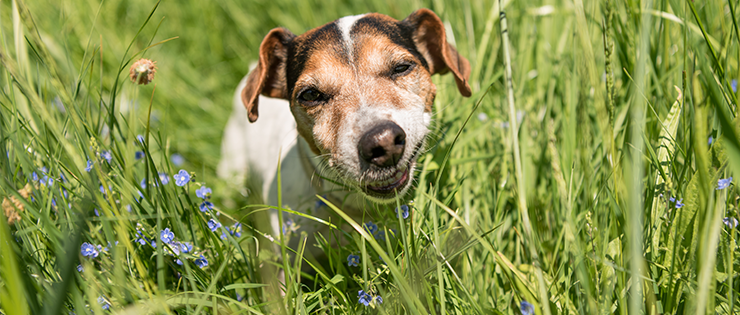
Why do dogs eat grass? This remains a question that dog owners, vets and researchers continue to ask. And, nobody has a definitive answer. We are maters of overcomplicating our dogs, especially when we cannot relate to the behaviour. Eating grass is something we imagine herbivores do exclusively. Whilst dogs may not be designed as plant eaters, we believe that they are not entirely designed as meat eaters either.
When I was at university, we studied taxonomy, which is the understanding of how animals fall into different classification groups. Classification begins with deciphering whether a living being has one cell or is multi-celluar, eventually progressing to if two individuals can produce viable offspring. It turns out, dogs are incredibly closely related to humans. Where we diverge genetically, is what’s called the Order classification. We fall into the Order called Primate and dogs fall into the Carnivora Order. Naturally, we’d expect animals who belong to the carnivora group, tend to be carnivores. Surprisingly however, a large number of them are not. This includes dogs.
Dogs have a comparatively shorter digestive tract, which indicates they are historically designed more for eating meat, however many aspects of their digestive system points to them being omnivorous. For instance, dogs have flat molars. Pure carnivores such as cats have sharp molars, called carnassial teeth. Dogs have also been observed eating the gut content of their prey, as well as the odd piece of fruit here and there. Plant material is however very difficult to gain nutrients from, as it has a cellular wall that most mammals can’t break down, without the assistance of foreign gut bacteria (bacteria ingested from faecal matter). Interestingly, koalas will eat the faeces of their mother, so that they have the bacteria to digest the thick cell walls of eucalyptus leaves.
So, if plant material is difficult to digest, why would a dog bother to eat grass? There is evidence to suggest that ingesting plants helps to cleanse the gut. It was found in recent studies that dogs who eat grass are not necessarily ill, nor do they regularly vomit afterwards (22% did). Most dogs were reported to display the behaviour of eating grass, with the majority of them not indicating signs of illness or distress.
As a behaviourist, I have observed many dogs eating grass when exposed to environments that may be stressful. There is no research on this to my knowledge, however I would be interested to see if repetitive grass eating was an indicator of displacement in some dogs. In other words, a dog who experiences anxiety and is unable to alleviate this emotion, may engage in repetitive behaviours, such as pacing, mounting, and possibly even eating grass. Most vets will tell you not to worry about this behaviour, as it is common, and generally harmless.
Perhaps it’s the taste? Or, maybe your dog learnt somehow that when they eat grass, they feel better. Maybe, your dog is anxious and finds the repetitive behaviour relieving? It may be time to consider the diet of your dog, and increase the plant portion for them. There are so many questions and suggestions to follow with dog health. In truth, eating grass for the most part is a normal and healthy behaviour. If your dog vomits afterwards, has a poor diet, or is drawn to grass when generally unwell, it is best to take your dog to the vet as soon as possible as well as consider improving their diet. Additionally, if you have an anxious dog, it may be worth redirecting their attention onto something positive to focus on such as a quick obedience trick or a game of fetch.
What I love about these subjects is that there is so much we really do not know about dogs. As we continue to learn more, we realise just how much we have in common with them and how much we should learn to observe and respect who they are. So, next time your dog heads for that grassy patch to munch on, don’t be too concerned. Keep an eye on them, and ensure they are healthy and happy. Never hesitate to catch up with your trusted vet if you’re worried. That’s what vets are there for.